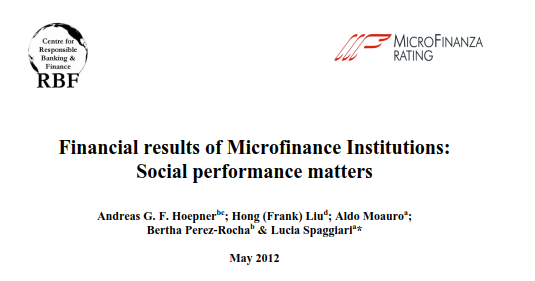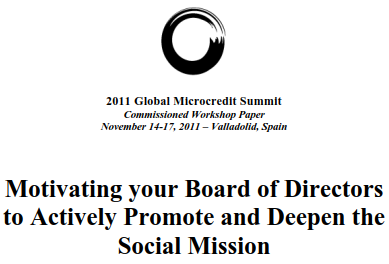
November 9, 2018
Assessment of the Sustainable Performance of SME Finance Service Providers
The European Microfinance Platform (e-MFP) and the Social Performance Task Force (SPTF) have published a study on the Assessment of the Sustainable performance of SME finance institutions. The study was drafted by Lucia Spaggiari, MFR Business Development Director, in collaboration with the e-MFP Investor Action Group and the Social Performance Task Force (SPTF) Social Investors Working Group. The proposed approach offers modular options to investors willing to assess the sustainable performance of SME FSPs (Financial Servive Providers). The suggested metrics adapt the SPTF Universal Standards of Social Performance Management to the different goals, language and needs of SME banks and other SME FSPs.
Download
September 6, 2013
Insight – Environment Rating
MFR would like to share some experience in environment rating, inspired by practices observed in the field while conducting social ratings of MFIs, aiming at promoting best practices.
Some may argue that the environment is not relevant in microfinance. While there is little debate around the major role that the public institutions should play, in our opinion microfinance institutions should be:
- encouraged to avoid harming the environment;
- rewarded for positive commitment and actions;
- regarded as powerful channels for green projects.

June 7, 2013
Insight – Transparency in practice
Examples of transparency into practice. MFR would like to share some experience in client protection, inspired by good practices observed in the field while conducting social ratings, client protection certifications and financial ratings of MFIs, aiming at promoting best practices.
Download
March 7, 2013
Insight – Treat your employees responsibly
This insight aims at contributing to the market transparency by providing an independent analysis of the implementation of USSPM #5 in the Philippines. MFR’s Social Rating methodology is fully aligned with the Universal Standards for Social Performance (USSPM) and includes a dedicated annex where the implementation of each standard can be demonstrated (USSPM external validation).
Download
December 12, 2012
Insight – Rating results: Asia
This insight presents the results of financial rating in Asia in particular. Following its mission, MFR provides microfinance institutions and investors with independent information to foster the microfinance sector transparency.
Download
September 10, 2012
Insight – Poverty outreach
MFR presents the actual poverty outreach observed in the industry over the past 7 years of social ratings. Microfinance promises to reach the poor and the excluded. Yet, very little is known about the profile of the clients reached.
Does microfinance reach the poor?
Sometimes yes, sometimes in part;
Sometimes it does not really want to;
Generally we say it does;
In most of the cases we do not know.

June 22, 2012
Industry Briefing – June 2012
Microfinance Industry Report Card: good performance of Cambodian MFIs driven by portfolio growth.
In the period January 2011 – April 2012, MFR rated 6 Cambodian MFIs, accounting for 50% of the total outstanding portfolio and 60% of total borrowers as of December 2011 (CMA Network Information Exchange).
Download
May 27, 2012
Financial results of Microfinance Institutions: Social performance matters
The purpose of this study is to contribute to the research on the relationships between financial and social performance of microfinance institutions.
The Centre for Responsible Banking & Finance at the University of St. Andrews (UK) applies advanced statistical techniques to the in depth performance data from MFR. The hypotesis that the relationship is parabolic instead of linear is broadly confirmed by the empirical results. Social performance (SP) management and social responsibility towards the staff are needed to sustain financial performance but lose their positive financial impact after a certain point (inverted U-shape). In contrast, building client protection systems from scratch can be costly, but the efforts pay off once the “minimum critical mass” of client protection is achieved to ensure the clients’ and investors‘ trust (U shape). The findings imply that SP matters for the financial results; understanding the synergies and the trade-offs between the two is key to balance the sustainability and the progress towards the social mission.
Download
November 22, 2011
Motivating your Board of Directors to Actively Promote and Deepen the Social Mission
Recent studies in the microfinance arena identify missions drifts of MFIs away from their socially responsible ambition and highlight that their boards of directors might lack motivation to commit to this key promise (Copestake, 2007). These tendencies to digress from the stated social mission, coupled with irresponsible institutional behavior, besides representing a governance failure, pose a systemic threat to the microfinance sector as a whole.
In this context, this workshop paper written for the Microcredit Summit Campaign explores some topics that have the potential to motivate the MFIs’ BoD to promote and deepen the social mission of their organizations.
Download
September 12, 2010
Social and financial performance
Investigating the relation between social and financial performance is key in a sector aiming at contributing to social development in a financially sustainable way. MFR is willing to contribute to the discussion by sharing some of the findings arising from the social ratings conducted so far, bringing in particular the added value of accurate data collected through client surveys.
The social performance indicators are taken from MFR’s methodology. With reference to financial performance, the main indicator is the Operational Self Sufficiency (OSS) ratio, mainly collected through financial ratings.
Download
May 7, 2010
Poverty Outreach and Financial Exclusion
MFR’s social rating methodology allows a direct measurement of poverty and financial exclusion.
Encouraging financial self-sufficiency and professional management of MFIs should not by any means discourage the original outreach objective of the microfinance mission, which is to cater financial services to those segments of the population living in poverty conditions.
MFR is willing to share its experience cumulated through social ratings in order to try to provide some concrete answers on the issue of depth of microfinance outreach. The analysis benefits from the added value of the comprehensive social rating methodology, which allows a direct measurement of poverty and financial exclusion thanks to surveys conducted on clients. Results are referred to a sample of recent clients of MFR.
Download
March 18, 2010
Consumer Protection and Social Responsibility
Social Responsibility and consumer protection have become critical issues in microfinance and there is evidence of a continuing effort within the sector to apply corporate social responsibility standards (staff, clients, community and environment) to microfinance as well. Moreover, the need to put clients first and to protect them from possible negative effects of the services provided is even more important for the microfinance industry whose declared target is to reach out to poor and vulnerable people.
The Smart Campaign was launched as a global effort to unite microfinance leaders around a common goal: to keep clients as the driving force of the industry and to widespread the implementation of the consumer protection principles.
Download